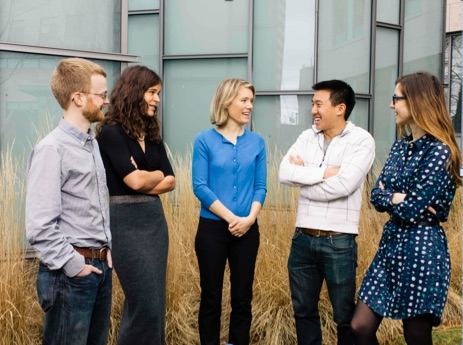CAMBRIDGE, MA—October 19, 2016—MIT announces today the second Call for Proposals from the International Policy Lab (IPL) at the Center for International Studies, which helps leading MIT researchers develop the policy implications of their research and thus better inform the policymaking community in the United States and abroad. The IPL provides funding and staff support for translating scholarly work into digestible, policy-relevant materials, and for direct outreach to policymakers.
“We are very pleased with the success of this initiative so far,” said faculty director Chappell Lawson, associate professor of political science. “Solving the challenges facing our country and the world is central to MIT's mission; better connecting MIT researchers and policymakers contributes to that goal. Engineers, scientists, and other scholars at MIT produce a great deal of research that has direct implications for policy, but it is not always in a form that helps policymakers know what to do tomorrow. We have found that many faculty members here want to have an impact on policy but don't feel familiar enough with how the process works to do so efficiently. Helping to connect the academic and policy communities is another way MIT can fulfill its mission of helping to solve the world's great challenges."
With support from the International Policy Lab, the Trancik Lab compiled a report on the link between emissions cuts and energy technology cost reductions ahead of the 2015 UN climate conference. It was presented at the White House and helped to inform discussions in Paris on strengthening commitments to reduce emissions every five years. From left to right: Patrick Brown, Magdalena Klemun, Jessika Trancik, Joel Jean and Gökşin Kavlak. (Photo courtesy Trancik Lab)
In its first call for proposals, the IPL received applications and offered support for projects with faculty members from all five of the Institute’s Schools, helping to translate and disseminate their research to policy audiences, soliciting feedback from policymakers, and providing funding for travel to policy-oriented meetings.
Richard Samuels, Ford International Professor of Political Science and director of the Center for International Studies, said “We are delighted to be working with colleagues across the Institute to help extend the reach of their path breaking ideas to the policy world.”
Projects from faculty spanned a diverse set of topics, including energy and environment, international security, health and biology, and privacy issues.
“IPL support was essential in responding to a request by the White House EOP for input ahead of the Paris climate negotiations on the rate and determinants of clean energy technology innovation. The virtuous cycle of technology improvement and emissions reduction that we documented in our report helped to inform discussions in Paris on the international commitment to ratchet up emissions reductions every five years,” said Jessika Trancik, Atlantic Richfield Career Development Assistant Professor of Energy Studies at the Institute for Data, Systems and Society. “This project would not have been possible without the quick response and expert capabilities of the IPL. This ability to help researchers respond in a timely and tailored way to request for policy-relevant input is much needed on campus and one of the very attractive features of the IPL.”
Thomas Peacock, associate professor of mechanical engineering, who studies physical oceanography and flow transport, said "Working with the IPL has provided invaluable support for enabling our research to impact the rapidly developing field of deep-sea mining. Through their guidance and connections we are able to work with policy makers and industry leaders, seeking to make a real difference."
R. Scott Kemp, assistant professor of nuclear science and engineering, who is studying the proliferation potential of laser enrichment, said, "The IPL has been able to bring a different set of people to the table and establish links to the policy community that will allow us to get feedback early, rather than our coming in at the end with a product that does not address their concerns."
“The support of the IPL program and team has allowed for fantastic opportunities to identify partnerships in public health policy and to facilitate onset of new collaborations and outreach activities,” said Lydia Bourouiba , assistant professor of civil and environmental engineering, who is studies respiratory disease transmission. “In addition, IPL support has been particularly valuable for receiving feedback early in the process of translating scientific research results into policy recommendations.”
About the Request for Proposals: Proposals are welcome from all researchers at MIT with principal investigator status who wish to engage the policy community in the US and abroad. Proposals are sought from all parts of MIT. Awards of up to $10,000 in direct costs per project are available; proposals that require only staff support for outreach are also welcome. Guidelines for submission are available at: https://policylab.mit.edu/proposals.
The submission deadline is December 09, 2016. Final selections will be made by February 15, 2017.
For questions on the application or examples of funded work, contact Dan Pomeroy, program manager of the International Policy Lab.
ABOUT MIT INTERNATIONAL POLICY LAB
The mission of the International Policy Lab is to enhance the impact of MIT research on public policy, in order to best serve the nation and the world in the 21st century. The IPL accomplishes the mission in the following ways: we meet with participating faculty to help them define realistic policy goals and develop an effective “impact plan” based on these goals and the time the faculty member wishes to devote; we provide modest grants for MIT faculty members to translate their scholarship into workable policy recommendations and to deliver those recommendations to policymakers; and we work with partners in Washington, DC (including both MIT’s Washington Office and prominent think tanks) to arrange meetings with relevant policymakers, media appearances, Congressional testimony, and other events designed to impact the policy process. IPL support allows MIT researchers to have a maximum impact on policy with minimal expenditure of faculty time.



